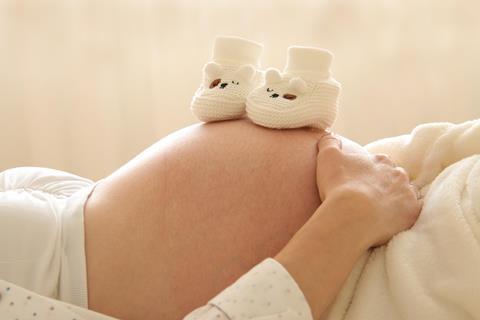If amendments to the Government’s Crime and Policing Bill are passed next week, a woman could have an abortion at any point and not face prosecution. While the media continues to focus on the assisted suicide bill, the possible decriminalisation of abortion is flying under the radar, says James Mildred

Over the last few months, countless newspaper column inches have been dedicated to the assisted suicide Bill brought forward by Labour MP Kim Leadbeater. For many groups, including CARE, this bill undermines human dignity and sends a dangerous message that some lives aren’t worth living. But while the Leadbeater Bill is absorbing a lot of media attention, another just as controversial proposal is barely being reported – the decriminalisation of abortion.
I would guess that many people reading this article are unaware of highly significant votes on this issue due to take place in parliament on 17 and 18 June. Abortion decriminalisation also poses a threat to the dignity of human beings at the other end of life’s spectrum.
What is being proposed?
It is currently illegal to have an abortion after 24 weeks of pregnancy, past the point when an unborn baby can survive outside of the womb. And doing so carries potential criminal sanctions. But proposed amendments to the Government’s Crime and Policing Bill would change this.
‘NC1’, from Tonia Antoniazzi MP would make it so that no offence is committed by a woman in relation to her own pregnancy. ‘NC20’, tabled separately by Stella Creasy MP, goes further. It seeks to exempt medical professionals involved in illegal abortions from legal consequences as well.
Human dignity, rightly understood, begins at the very start of life and lasts until its natural end
These amendments have come on the back of a small number of cases involving women being investigated for self-administered abortions. Some of these arose from a controversial ‘abortion pills by post’ scheme, introduced during the pandemic, which allows pills to be accessed without an in-person appointment with a medical professional.
Campaigners complained that women shouldn’t face criminal action for illegal abortions. While it is true that some of the cases involved very poor and insensitive handling by the police, they do not justify removing all remaining protections for unborn babies from our abortion law.
Hard cases and bad laws
It’s often said that hard cases make for bad law. And abortion decriminalisation would be a very bad settlement indeed – for women and babies. These amendments would pave the way for more, late term ‘DIY’ abortions, carried out for any reason and at any time up until birth. Such abortions necessarily mean trauma, often lead to hospitalisations, and even see life-threatening complications.
The approach being advocated jars with existing policies in several areas. NHS surgeons operate to save babies in the womb and recognise fetal pain. We take account of the needs of an unborn child in safeguarding cases.
Most importantly, abortion decriminalisation sends a terrible message that the ending of an unborn baby’s life is a small thing. Something never to be punished. It stands in stark contrast to God’s word, which ascribes worth and dignity to human life from its earliest moments. We are “knitted together” in our mother’s wombs (see Psalm 139:13). Human dignity, rightly understood, begins at the very start of life and lasts until its natural end.
A Christian response
In terms of our response as citizens engaging in democracy, Christians can - and should be - writing to their MP to express dismay about the abortion amendments and asking them to vote against them. CARE’s website has a tool to help you do this quickly and simply.
Very sadly, it does seem that NC1 is going to pass. Many MPs have already pledged to back it. But this is not guaranteed.
How should the church respond? On one level, this is obvious. We must continue to teach that abortion is a sin that grieves God’s heart and stress that both lives matter in every pregnancy. We must herald the better story we find in the Bible, namely that God designed a beautiful world and made human beings in his own image and likeness. As Psalm 8:5 captures beautifully, human beings are unique, crowned with glory and honour and dignified from the moment of conception. Let’s tell that story.
Abortion decriminalisation would be a very bad settlement indeed – for women and babies
But we need to do more. We need to be holistically pro-life. This means standing up for God’s good design across the whole of human life, from the womb to the tomb. We need to be advocates of justice for the oppressed, marginalised and forgotten. We need to champion marriage and the importance of commitment. We also need to address some of the root causes of abortion in our society – poverty, structural inequalities and family breakdown.
And we need to approach this whole issue with “tears in our eyes, rather than judgement or harsh rhetoric” as Christian ethicist John Wyatt says. We need to be quick to listen and hold out the hope of forgiveness found in Jesus. Abortion is a terrible thing. But Jesus died to take away our sins. His blood covers the sin of abortion and there is hope and freedom for all who put their trust in him. This truly is good news.
Finally, the Church must challenge itself to act, showing the love of Christ practically. That means stepping up to adopt and foster children without a home and a hope in this world. That means sacrificial giving to those struggling to get by and supporting initiatives that look after babies and mothers before and after birth. The practical service of the early Church was a powerful witness to the cultures of that day.
If abortion decriminalisation happens, we should lament this outcome. But let us recommit to telling the better story and being Jesus’ hands and feet to the watching world.






































No comments yet